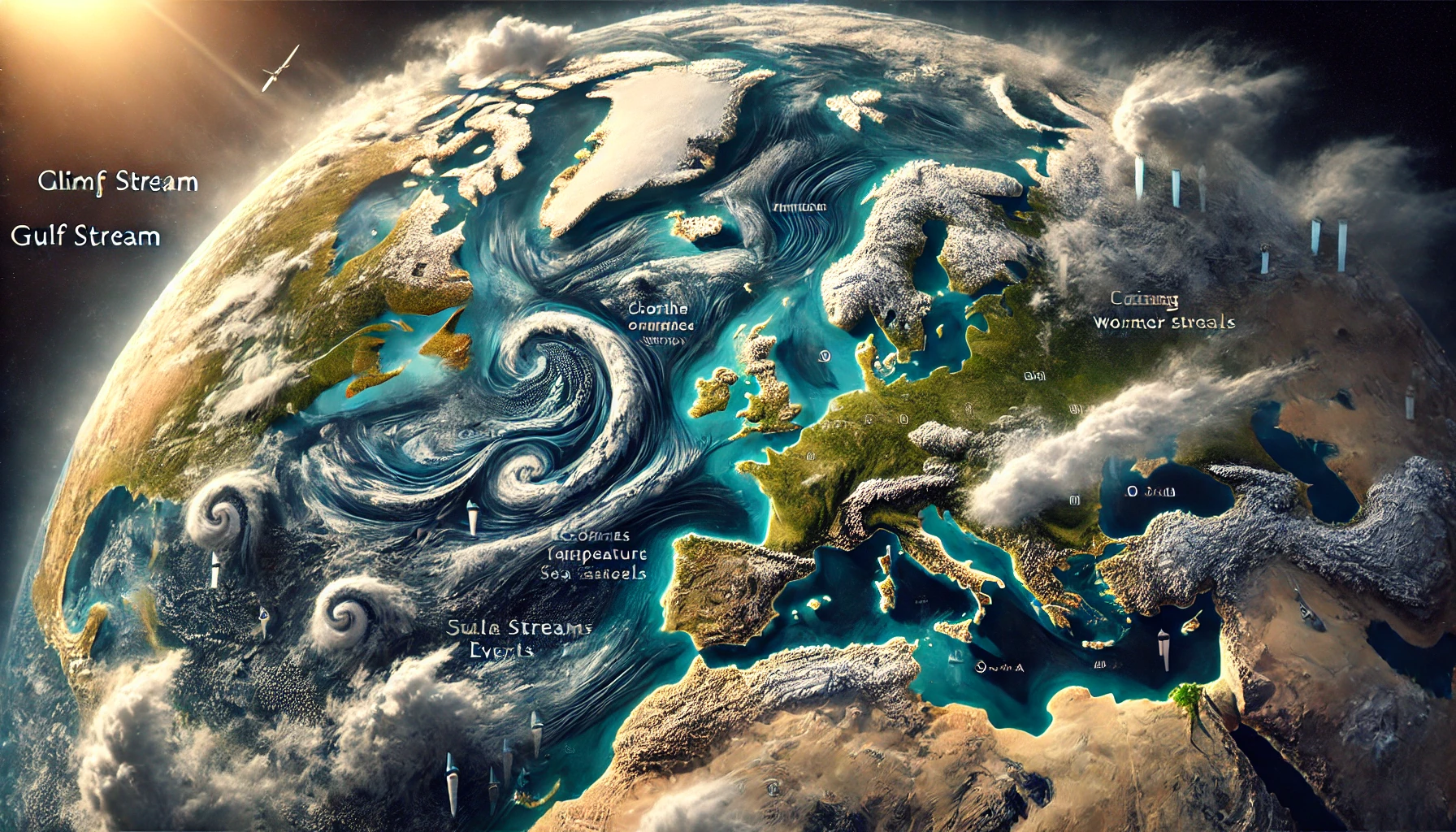🌊 The Gulf Stream: Wind-Powered Wonder at Risk from Climate Change 🌬️

The Gulf Stream, one of the most powerful ocean currents, plays a crucial role in regulating the climate. New research reveals that this wind-powered giant might be weakening due to climate change. 🌡️ Let’s dive into what this means for our planet and how it could impact our future. 🕵️♂️
What is the Gulf Stream? 🌐
The Gulf Stream is a strong, warm ocean current that originates in the Gulf of Mexico, flows up the eastern coast of the United States, and crosses the Atlantic Ocean towards Europe. This current is a key player in the Atlantic Meridional Overturning Circulation (AMOC), which is essential for maintaining the climate balance in the Northern Hemisphere.
How the Gulf Stream is Powered by Wind 🌪️
Unlike many ocean currents, the Gulf Stream is primarily driven by wind rather than differences in water temperature and salinity. The strong winds over the Atlantic Ocean push the surface waters, creating the powerful flow that defines the Gulf Stream. This wind-driven mechanism makes the Gulf Stream uniquely vulnerable to changes in wind patterns, which can be influenced by global climate change.
Climate Change and the Gulf Stream: A Troubling Connection 🌍
Recent studies, including those highlighted in the ScienceDaily article, suggest that climate change is altering wind patterns over the Atlantic. This shift could potentially weaken the Gulf Stream, leading to significant climatic consequences. Here’s why this matters:
- Temperature Regulation: The Gulf Stream helps transport warm water from the tropics to the North Atlantic, playing a crucial role in regulating temperatures. A weakened Gulf Stream could lead to cooler temperatures in Europe and warmer waters along the eastern U.S. coast.
- Sea Level Rise: The strength of the Gulf Stream influences sea levels. A slowdown could contribute to rising sea levels along the eastern coast of North America, exacerbating the impact of storm surges and coastal erosion.
- Weather Patterns: The Gulf Stream affects weather patterns, including the frequency and intensity of hurricanes. Changes in the current could lead to more extreme weather events.
The Science Behind the Research 🔬
Scientists have utilized advanced climate models and observational data to understand the relationship between wind patterns and the Gulf Stream. According to the researchers, the ongoing changes in the jet stream—a major driver of wind patterns over the Atlantic—are linked to rising global temperatures. As the Arctic warms faster than the equator, the temperature gradient that drives the jet stream weakens, leading to slower and more meandering wind patterns.
Future AI Technology: A Solution for Climate Change? 🤖🌍
Artificial Intelligence (AI) is emerging as a powerful tool in the fight against climate change. Here’s how AI can help address the issues facing the Gulf Stream and broader climate challenges:
- Predictive Modeling: AI can enhance climate models by processing vast amounts of data to predict changes in wind patterns and ocean currents more accurately. This can help scientists understand potential future scenarios and plan accordingly.
- Climate Monitoring: AI-powered satellite systems and sensors can continuously monitor the Gulf Stream and other critical climate indicators. These systems can detect subtle changes in real-time, allowing for quicker responses to emerging threats.
- Renewable Energy Optimization: AI can optimize the placement and operation of wind and solar farms to reduce reliance on fossil fuels. By harnessing clean energy sources more efficiently, we can mitigate the effects of climate change.
- Smart Coastal Management: AI-driven models can predict the impacts of sea level rise and coastal erosion, helping communities develop better strategies for coastal defense and management.
AI in Action: Real-World Examples 🌟
- DeepMind’s Climate Forecasting: Google’s AI subsidiary, DeepMind, has developed advanced AI models to improve weather forecasting. These models can provide more accurate predictions of extreme weather events, helping communities prepare and respond effectively.
- IBM’s Green Horizon Project: IBM is leveraging AI to predict pollution levels, optimize renewable energy production, and improve energy efficiency. This initiative aims to reduce greenhouse gas emissions and combat climate change on a global scale.
For more insights on how AI is being used to combat climate change, check out this AI and Climate Change article from NASA.
Conclusion 🌟
The Gulf Stream is a vital component of our climate system, and its potential weakening due to climate change is a significant concern. By understanding the science behind this phenomenon and taking proactive measures, we can better prepare for the future and protect our planet. AI technology offers promising solutions to monitor, predict, and mitigate the impacts of climate change, ensuring a stable and healthy environment for generations to come.
🌊✨ Let’s stay informed, support scientific research, and advocate for policies that address climate change to ensure a stable and healthy environment for generations to come. 🌍💪
References:
- ScienceDaily. (2024). The Gulf Stream is wind-powered and could weaken from climate change.
- National Oceanic and Atmospheric Administration (NOAA).
- Intergovernmental Panel on Climate Change (IPCC) Reports.
- NASA. AI and Climate Change.
